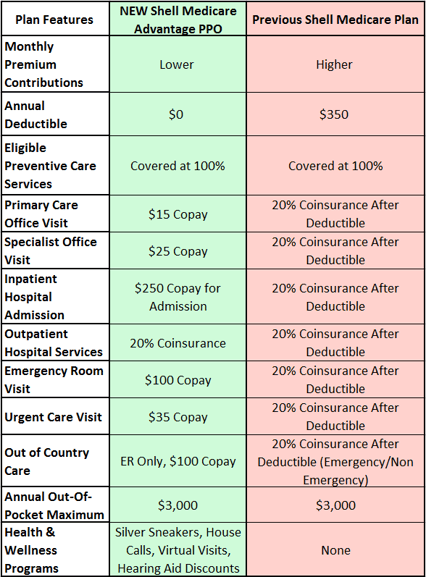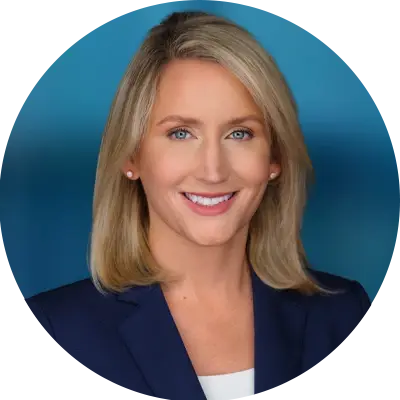You are about to celebrate your 65th birthday. You’ve heard from friends and colleagues that you need to sign up for Medicare… but what is Medicare? Who is eligible for Medicare, and what does it cover?
There are 4 available parts of Medicare:
Hospital Insurance (Part A) – Provides coverage for hospital stays, skilled nursing facilities, hospice care, or home health services.
Medical Insurance (Part B) – Provides coverage for doctor’s services, outpatient care, medical supplies, and preventive services.
Medicare Advantage Plans (Part C) – Part C provides both your Part A and Part B benefits. These are plans offered by private companies that contract with Medicare. Some private companies offer this type of plan to their retired employees. (See the sections at the end of this article regarding the Shell Medicare Advantage PPO Plan)
Prescription Drug Coverage (Part D) – Adds drug coverage to Medicare plans.
What Do You Need to Do for Medicare Enrollment When You Turn 65?
When do I enroll in Medicare?
Your initial enrollment period begins 3 months before you turn 65 and ends 3 months after that birthday.
Am I required to enroll in Medicare?
You are required to at least sign up for Medicare Part A. You can sign up for Part B but you will pay a premium for Part B coverage.
Can I enroll in Part A Medicare coverage when I turn 65 and sign up for Part B Medicare coverage at a later date?
You can turn down Part B coverage and sign up for it later, but you may have to pay a late enrollment penalty.
Who should turn down Part B Medicare coverage and when?
If you are still working upon turning 65 (or your spouse is still working) and you are covered by group health, you might turn down Part B coverage at that time.
If I choose to postpone enrolling in Part B Medicare, how do I enroll at a later date?
You will be able to sign up for Part B later during a Special Enrollment Period. This gives you the option to sign up for Part B while you are still employed or you can sign up within an 8-month period after your group health coverage ends.
Medicare Enrollment Costs: What Will Medicare Cost You Each Month?
Now that you know when you should sign up, you are probably wondering how much Medicare will cost you per month.
How much do Medicare Part A premiums cost?
Part A premiums can range between $0 to a maximum of $471 monthly, depending on your income and the amount of Medicare taxes you have paid in the past.
How much do Medicare Part B premiums cost?
Part B premiums start at $148 monthly and increase based on your adjusted gross income. A two-year lookback period will be applied to your income to determine your Part B premium.
How much do Medicare Part C and D premiums cost?
Part C and D premiums will vary based on the type of plan you choose to sign up for from a private company. There are also deductibles and co-pays for the various plans in addition to the monthly premium.
What Do Shell Employees Need to Know About the Shell Medicare Advantage PPO Plan?
Shell recently began offering their Medicare-eligible employees a new Medicare Advantage PPO Plan through UnitedHealthcare. This plan combines your Part A and Part B coverage into one plan (Part C Plan).
Am I eligible to participate in the Shell Medicare Advantage PPO Plan?
You must be enrolled in both Part A and Part B in order to be eligible for participation in the Shell Medicare Advantage PPO plan. A Part C Advantage plan will coordinate payment for medical needs between Part A and B and may offer additional coverage over and above what you receive through Medicare.
Note, you cannot have a Medicare Advantage plan in conjunction with a Medigap policy (also known as a Medicare Supplement Plan).
What Benefits Are Included in the Shell Medicare Advantage PPO Plan?
The chart below shows some of the benefits available through the Shell Advantage plan.

What Do The Shell Medicare Advantage PPO Benefits Mean For Shell Retirees?
-
- You receive higher-level coverage with a lower monthly premium contribution
- You will receive the same benefit level in-network or out-of-network
- You can continue to see your current health care providers as long as they accept Medicare and the Shell Medicare Advantage PPO plan
When and Where Do I Enroll in the Shell Medicare Advantage PPO Plan?
Medicare Advantage plans have specific enrollment periods. You will want to contact the Shell Benefits coordinator to determine when the next enrollment period is and what your premium for this plan will be.
You can apply for Medicare online here or find additional information about your specific situation on Medicare.gov.
Each person’s situation will be different depending on their coverage needs, income, and retiree benefits offered by their employer. That’s why cookie-cutter advice rarely works for our clients who have above-average life goals and unique company benefits. Consult with a trusted advisor or contact a member of the Willis Johnson & Associates team to better understand your Medicare options.







